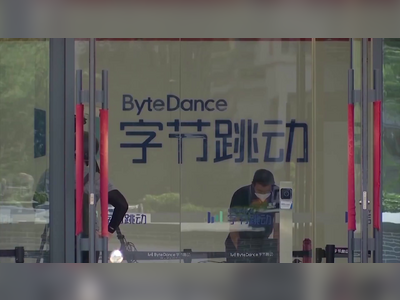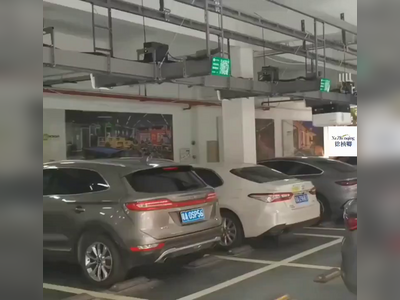Saving India's Endangered Elephants: Preventing Train Collisions with AI and 'Animal Flyovers'
Wildlife experts suggest that the use of Artificial Intelligence (AI) and "animal flyovers" could help prevent hundreds of wild elephants from being hit by trains in India each year.
This comes after a nine-month-old elephant calf named Bani was orphaned and seriously injured when her mother was killed by a train while crossing the tracks near Jim Corbett national park.
Bani received medical care and nurturing after the incident, but many elephants do not survive such encounters.
Experts believe that implementing technologies like AI to detect and alert train drivers of elephant presence, as well as constructing "animal flyovers" or underpasses for elephants to safely cross railway tracks, could help reduce the number of elephant-train collisions.
A local forest department in India took care of a frightened and injured calf named Bani for several weeks without progress.
They contacted NGO Wildlife SOS for help, who sent a team of experts to provide critical care.
Bani was then transported to India's first specialist elephant hospital in Mathura for intensive treatment, including laser therapy, physiotherapy, hydrotherapy, nerve stimulation, and ayurvedic massage.
She was able to twitch her tail, indicating her spine would recover, and with the help of a harness, she stood for a few minutes.
Although she may have a handicap, Bani is becoming less scared and more playful each day.
A wild elephant named Bani, who is fond of bananas and prone to tantrums, is the first elephant to reside in a hospital in India due to injuries from train collisions.
The growing threat to elephants comes from railway lines that cut through their habitats and migration corridors.
The Indian Railways prioritize cost over elephant protection, leading to over 200 elephant deaths from train collisions in the past decade.
Indian elephants, classified as endangered, face declining numbers, with approximately 40-50,000 remaining in the wild.
The text discusses the plight of elephants in India, with over half of their habitat lost due to human development.
The Wildlife SOS elephant sanctuary provides care for rescued elephants, many of which have suffered human violence and now live with disabilities or blindness.
Shivam Rai, head coordinator at Wildlife SOS, expresses regret for the elephants' suffering and the loss of their freedom.
Additionally, the text mentions the issue of elephants being killed by trains and the implementation of AI-enabled surveillance systems to prevent accidents.
The text discusses efforts to reduce elephant-train collisions in India through various safety measures.
Sensors detecting elephant movement are being used to alert train drivers, station staff, and line controllers.
Vibration-sensing systems are also being installed to accurately detect elephants.
Over 40 alerts are triggered daily by one such system in north-east India.
Another approach involves building flyovers covered with foliage to provide safe passages for wildlife.
For instance, a flyover in West Bengal, lined with bamboo and banana trees, has been constructed to encourage elephants to use it and cross the tracks safely.
However, implementing safety measures across India's extensive railway network, which spans 130,000km and includes 150 elephant corridors, poses a significant challenge.
The text emphasizes the importance of such measures, as an AI early warning system could have prevented the death of an elephant named Bani and her calf's disability.
The forest is seen as the elephants' home, and the railways are viewed as an invasion.
Satyanarayan emphasizes the need for AI-enabled accident prevention systems and speed controls to save elephants from being hit by vehicles.
Bani is one such elephant who survived such an accident but is recovering slowly with a steady improvement in appetite and ability to hold herself up.
However, her progress is tinged with sadness as she may never be able to live a normal or wild life again due to her injuries.
The hope is that she recovers enough to live a life of dignity and freedom despite her handicap.
Bani received medical care and nurturing after the incident, but many elephants do not survive such encounters.
Experts believe that implementing technologies like AI to detect and alert train drivers of elephant presence, as well as constructing "animal flyovers" or underpasses for elephants to safely cross railway tracks, could help reduce the number of elephant-train collisions.
A local forest department in India took care of a frightened and injured calf named Bani for several weeks without progress.
They contacted NGO Wildlife SOS for help, who sent a team of experts to provide critical care.
Bani was then transported to India's first specialist elephant hospital in Mathura for intensive treatment, including laser therapy, physiotherapy, hydrotherapy, nerve stimulation, and ayurvedic massage.
She was able to twitch her tail, indicating her spine would recover, and with the help of a harness, she stood for a few minutes.
Although she may have a handicap, Bani is becoming less scared and more playful each day.
A wild elephant named Bani, who is fond of bananas and prone to tantrums, is the first elephant to reside in a hospital in India due to injuries from train collisions.
The growing threat to elephants comes from railway lines that cut through their habitats and migration corridors.
The Indian Railways prioritize cost over elephant protection, leading to over 200 elephant deaths from train collisions in the past decade.
Indian elephants, classified as endangered, face declining numbers, with approximately 40-50,000 remaining in the wild.
The text discusses the plight of elephants in India, with over half of their habitat lost due to human development.
The Wildlife SOS elephant sanctuary provides care for rescued elephants, many of which have suffered human violence and now live with disabilities or blindness.
Shivam Rai, head coordinator at Wildlife SOS, expresses regret for the elephants' suffering and the loss of their freedom.
Additionally, the text mentions the issue of elephants being killed by trains and the implementation of AI-enabled surveillance systems to prevent accidents.
The text discusses efforts to reduce elephant-train collisions in India through various safety measures.
Sensors detecting elephant movement are being used to alert train drivers, station staff, and line controllers.
Vibration-sensing systems are also being installed to accurately detect elephants.
Over 40 alerts are triggered daily by one such system in north-east India.
Another approach involves building flyovers covered with foliage to provide safe passages for wildlife.
For instance, a flyover in West Bengal, lined with bamboo and banana trees, has been constructed to encourage elephants to use it and cross the tracks safely.
However, implementing safety measures across India's extensive railway network, which spans 130,000km and includes 150 elephant corridors, poses a significant challenge.
The text emphasizes the importance of such measures, as an AI early warning system could have prevented the death of an elephant named Bani and her calf's disability.
The forest is seen as the elephants' home, and the railways are viewed as an invasion.
Satyanarayan emphasizes the need for AI-enabled accident prevention systems and speed controls to save elephants from being hit by vehicles.
Bani is one such elephant who survived such an accident but is recovering slowly with a steady improvement in appetite and ability to hold herself up.
However, her progress is tinged with sadness as she may never be able to live a normal or wild life again due to her injuries.
The hope is that she recovers enough to live a life of dignity and freedom despite her handicap.




























